Sex Matters influences toilets policy
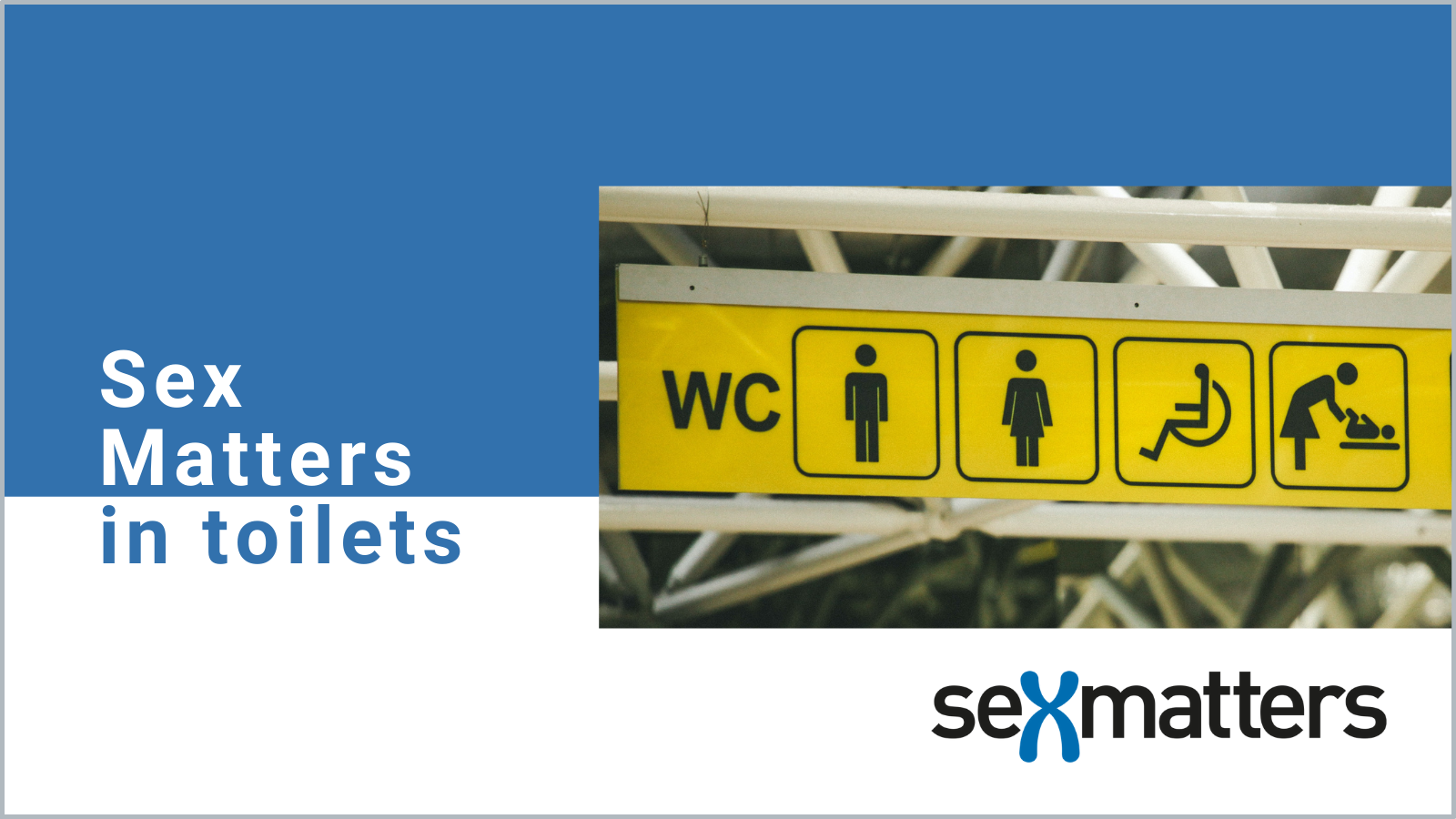
As reported in The Telegraph today the Government in England is going to amend building regulations and planning guidance to ensure separate sex toilet facilities are installed in new buildings or those being developed.
This is good news.
Sex Matters was amongst the many gender critical organisations and individuals that made an input to the technical review, following a public outcry over government bodies, schools and businesses replacing male and female toilets them with mixed sex “gender neutral” ones.
We look forward to seeing the proposed regulation. We welcome the government’s recognition that single sex facilities meet an important everyday need for privacy, security, dignity and safety.
In particular we welcome the statement that the Government will:
“address misconceptions that removing sex-specific toilets are a requirement of equality legislation”
This is something we emphasised strongly in our input to the review.
We hope the regulations will also make provision for limited additional self-contained unisex toilets, which allow people who don’t wish to use single sex toilets of their own sex to be included in public life without uncertainty, tension or conflict.
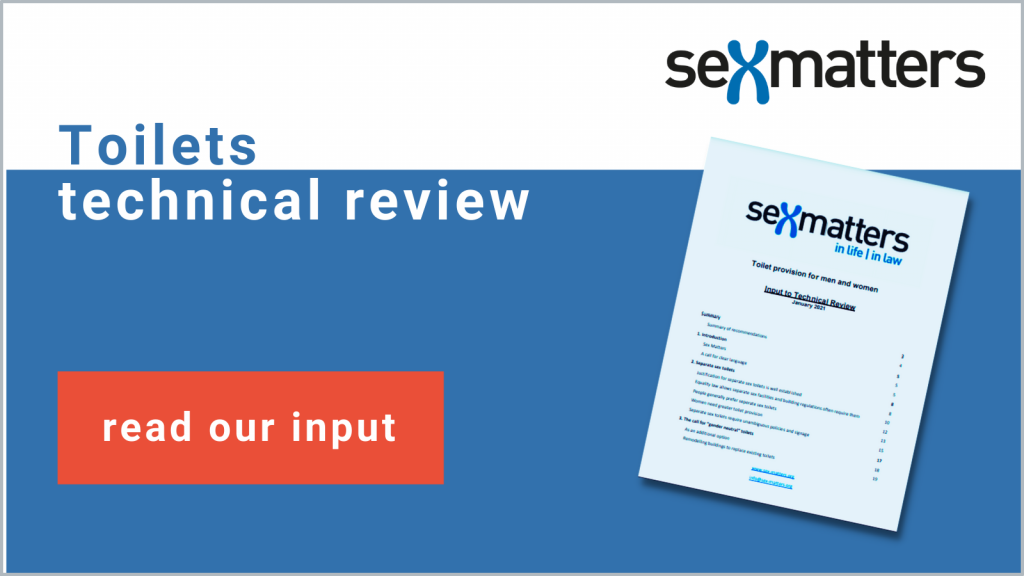
Sex Matters input to the technical review
Our input to the technical review argued:
- The case for separate sex toilets is well established; based on hygiene, security, dignity, privacy and deterrence of anti-social behaviour and crime.
- Regulations already call for separate sex toilets. They cover public toilets, toilets in workplaces, schools, licensed venues, and new or renovated buildings.
- They require toilets to be segregated by sex, unless they are provided as a unisex design (i.e. fully enclosed rooms).
- The Equality Act allows single and separate services in many common situations, including toilets. It does not require that people are able to access opposite sex services on the basis of their gender identity or gendered clothing.
- Separate sex toilets are preferred by most people. Providing an additional unisex option is also good practice.
- People should be able to easily tell which toilets and washrooms they are permitted to use. This requires clear policies and signage.
- Some organisations are replacing their separate sex toilets with unisex (“gender neutral’) facilities, or replacing clear sign signage with ambiguous messages. This disadvantages women and children in particular, and may be in breach of health and safety regulations.
- Organisations are doing this because they feel unable to communicate clear sex-based rules. Guidance from official sources and advocacy organisations to change sex for “gender identity” is unlawful and unworkable and creates uncertainty and potential for conflict. It undermines inclusion.
- Toilets don’t need to be a battleground. Organisations should retain separate sex toilets, with clear rules and signage, and offer a unisex option where possible. Many organisations do this already. Clear guidance on these principles would give confidence to all.
Clear signage and policies matter
We emphasised that clear signage and policies are important, so that everyone understands which toilets they can use. Signs like this are not inclusive.
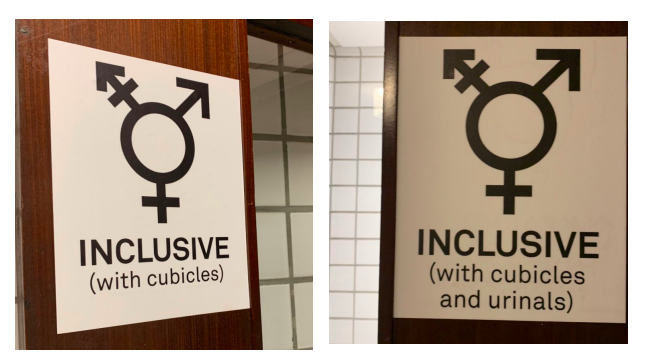
Nor are signs like this, which undermine the legitimate privacy of single sex facilites
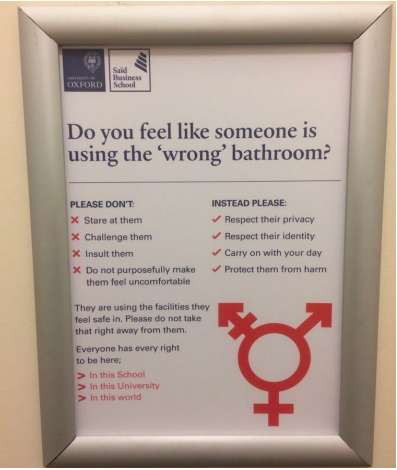
Signs such as this (these are standard symbols established by the International Standards Organisation and used by the British Standards Institute) should be clear and understandable.
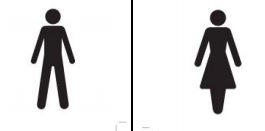
Ambiguity serves no one well
The basic words and symbols which communicate male, female or unisex toilets must be able to be consistently understood across different settings and by different people to avoid conflict and uncertainty. The recent promotion of ambiguity about whether these signs mean single sex or not does not serve anyone well:
- A YouGov survey in 2020 that only 31% agree that a “transgender woman” (a category that it explained includes those who have not had surgery) should use women’s toilets. This falls to 17% of those over 65s.
- A Stonewall report that almost half (48 per cent) of trans people who answered their survey don’t feel comfortable using public toilets. A survey by the LGBT organisation GALOP found that 44% of trans respondents used public toilets less because of the attitudes of other users.
The need for clear rules that make everyone feel comfortable, mean that access to single sex spaces cannot be negotiated by members of the opposite sex on an individual basis or on the basis of kindness or individual risk assessment.
Our recommendations for clear guidance
Our submission to The Ministry of Housing Communities and Local Government included a recommendation that they should issue clear, simple guidance to service providers and to support and advisory organisations,
along these lines:
- Site managers and planners should ensure there is sufficient provision for all users, and follow relevant legislation.
- They should have clear policies about which toilets and associated washrooms are single sex (male or female); unisex (to be used by either sex, one at a time or in limited groups such as families or disabled people with carers); or mixed sex (rooms in general use by people of both sexes at the same time).
- These policies and rules should be clearly communicated in signage, using standard symbols and simple words, and in information provided to visitors (including online) and in staff handbooks.
- It is preferable to provide separate male and female toilet facilities, including separate washroom areas, wherever space allows.
- In addition, it is good practice to provide a unisex alternative (sometimes termed “gender neutral”).
- Unisex options should be fully enclosed rooms with sink and mirror etc inside. Ordinary toilets with urinals, cubicles and shared sink areas should not be relabelled as “inclusive” or “gender neutral”.
- Where unisex facilities are not adjacent to men’s and women’s toilets, signage near the entrance to the single-sex facilities could indicate where the nearest unisex facilities are.
- A unisex accessible toilet that is open access can be used both by people with disabilities and others needing more space or privacy than offered by single sex toilets.
- Where there is high demand for unisex facilities, they should be provided separately from facilities intended to meet specific needs of disabled people, in order to avoid conflict and competition for limited facilities.
- Train staff to communicate policies and treat everyone with respect while communicating clear rules.
Sex Matters will be producing practical, good practice guidance for service providers based on our submission to the technical review.
